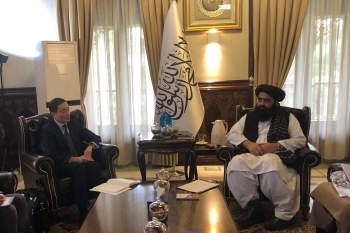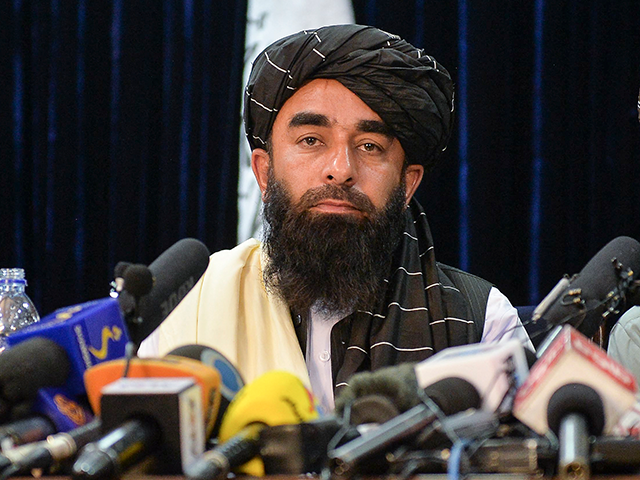The government of Japan announced on Monday that it had prepared a humanitarian aid project for Afghanistan worth $106.7 million “implemented by the U.N. agencies,” suggesting an attempt to keep the money out of Taliban hands.
Afghanistan is one of the world’s most destitute nations. The polling firm Gallup found in a survey published last week that 86 percent of Afghans say they do not have enough money for food and 90 percent described surviving on their income as “difficult or very difficult.” The poll found a record high 71 percent of Afghans answered that survival is “very difficult” in the country.
The country has faced an ongoing humanitarian crisis since the last time the Taliban ran the country in the 1990s, exacerbated by the 20-year Afghan civil war. The war ended last year after leftist President Joe Biden extended a previously agreed-upon deadline of May 2021 into September, prompting a wave of Taliban military victories across the country and, ultimately, the withdrawal of American troops in September.
Astonishing, depressing figures out of Afghanistan from @GallupNews:
– 86% of Afghans surveyed say they cannot afford sufficient food.https://t.co/NvYRjrklcY— Nick Schifrin (@nickschifrin) December 1, 2022
The Taliban takeover resulted in international banking institutions freezing Afghan government assets, leaving the Taliban poorly funded. The Taliban has demanded those funds on the grounds that it is the true government of Afghanistan and that it would use the money for humanitarian purposes but has provided no grounds to believe that it would not use that funding for terrorist activities or repression of the Afghan people.
The Taliban, a Sunni jihadist organization that currently enforces a fundamentalist interpretation of Islamic law on Afghanistan, has controlled the country since August 15, 2021, when then-President Ashraf Ghani fled the country. No nation on earth has formally recognized the Taliban as the government of Afghanistan, nor has the United Nations offered it the seat representing the country. Multiple nations – such as Iran, China, and Russia – have established unofficial ties with the terrorist organization, however, and multiple United Nations agencies maintain communications with Taliban leaders. The U.N. greenlit cooperation with the Taliban in March.
Japan has maintained an informal link to the Taliban through its embassy in Kabul. In October, Foreign Minister Hayashi Yoshimasa announced that Japan would formally return to diplomatic activity through the embassy in Kabul for the first time since the Taliban’s return to power.
“At the moment, the Japanese Embassy in Kabul has begun its limited activity and is doing the minimum necessary work. For security reasons, I refrain from mentioning the details,” he noted at the time.
On Monday, that embassy posted a message on Twitter announcing a major humanitarian assistance donation to the country.
“We truly hope these projects will help bring many smiles of [sic] Afghan people!” the embassy announced on Twitter.
Pleased to announce that Japan 🇵 has decided additional 106.7 million USD assistance for Afghanistan, enabling implementation of humanitarian and basic human needs assistance projects. We truly hope these projects will help bring many smiles of Afghan people! 1/2
— Embassy of Japan in Afghanistan (@JapaninAFG) December 6, 2022
The nearly $107 million would reach Afghans, the embassy specified, through “the UN agencies, int’l [sic] organizations and NGOs, all aiming for the betterment of livelihoods through multiple approaches.”
Japan has donated $335 million to Afghanistan since the Taliban takeover in August 2021, the embassy noted.
The Afghan outlet Khaama Press specified that Japan would be distributing the money through 16 international organizations, several of them United Nations agencies with friendly ties to the Taliban, including the World Food Program (WFP) and UNICEF. The donation appeared to result from a visit to Japan by American special envoy for Afghanistan Thomas West, who also traveled to the United Arab Emirates (UAE) and India to discuss stabilizing Afghanistan.
The government of Japan will provide roughly 106.7 million dollars to Afghanistan, according to a statement from the Japanese Embassy in Kabul, to support the realization of humanitarian programs and basic needs.
Click to read more.https://t.co/ouVDHvpRj2— Khaama Press (KP) (@khaama) December 6, 2022
Japan has donated about $7 billion to “global reconstruction efforts” in Afghanistan since 2001, when America invaded the country in response to the September 11, 2001, terrorist attacks. The Taliban long maintained — and extensive evidence suggests that it continues to maintain — relations with al-Qaeda, the jihadist organization responsible for the September 11 killings.
The emphasis on donating money directly to the United Nations appears to be an attempt to prevent the Taliban from misappropriating the funds. Yet Japanese officials have on occasion communicated with Taliban leaders and attempted to maintain workable relations. In May, Japanese Ambassador to Afghanistan Okada Takashi met with senior Taliban leaders to request they “ensure the safety of Japanese nationals and local staff and realize quick and safe passage of those who wish to leave the country.” Okada also mentioned that Japan was working “through international organizations” to provide aid to Afghans.
West Discusses Afghan Political Dialogue with Japan Officials#TOLOnewshttps://t.co/Z4R4dWs5oQ
— TOLOnews (@TOLOnews) December 3, 2022
“In response, the Taliban side expressed their gratitude for the assistance from Japan, and explained their stance that the Taliban will continue to address requirements from the international community, including the issue of girls’ secondary education,” the Japanese Foreign Affairs Ministry said in a readout at the time.

Japanese Ambassador Okada talks with senior member of the Taliban Abdul Kabir in Kabul, Afghanistan in May 2022. (Japan Ministry of Foreign Affairs)
The organizations that the Japanese embassy mentioned as partners in the aid package on Monday also maintain relations with senior Taliban terrorists and have funded the regime. United Nations Secretary-General Antonio Guterres has urged international institutions and states to lift sanctions on the Taliban, claiming it is impossible to help the Afghan people without doing so.
“We need to give financial institutions and commercial partners legal assurance that they can work with humanitarian operators without fear of breaching sanctions,” Guterres said in January. “At this moment, we need the global community — and this Council — to put their hands on the wheel of progress, provide resources, and prevent Afghanistan from spiraling any further.”
The United Nations gifted the Taliban $32 million in aid in January, intended for humanitarian projects.
As recently as two days after the Taliban takeover last year, the head of Afghan operations for UNICEF was expressing ill-placed hope that the Taliban would allow girls to go to school, a promise the Taliban made and promptly broke upon returning to power. The UNICEF official, Mustapha Ben Messaoud, described himself as “very optimistic” about the issue and asserted the agency had “not had a single issue with the Taliban.”
Both the WFP and the U.N. refugee agency, UNHCR, began operating in Afghanistan with the Taliban’s blessing in November 2021.

COMMENTS
Please let us know if you're having issues with commenting.